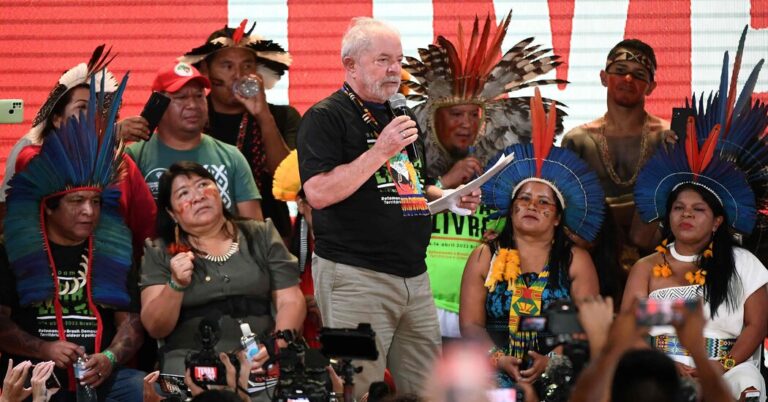Supreme Court Rejects Bid to Trademark ‘Trump Too Small’
The Supreme Court on Thursday rejected a California lawyer’s attempt to trademark the phrase “Trump too small.”
The decision was unanimous on the bottom line but badly fractured on the rationale, with the justices arguing over whether a history-based methodology introduced in a recent Second Amendment case should be used to decide First Amendment disputes.
The case concerned a federal law that forbids the registration of trademarks “identifying a particular living individual except by his written consent.”
“We hold only that history and tradition establish that the particular restriction before us,” Justice Thomas wrote for five justices, “does not violate the First Amendment.”
Justice Sonia Sotomayor, in a concurring opinion that in places read like a dissent, was sharply critical of what she said was “the indeterminacy of the court’s history-and-tradition inquiry, which one might aptly describe as the equivalent of entering a crowded cocktail party and looking over everyone’s heads to find your friends.”
“To make matters worse,” she went on, “the five-justice majority that undertakes this tradition-as-dispositive inquiry found its friends in a crowded party to which it was not invited. That majority has drawn conclusive inferences from its historical evidence, all without any guidance from the litigants or the court below.”
In his trademark application, the lawyer, Steve Elster, said that he wanted to convey the message that “some features of President Trump and his policies are diminutive.” Mr. Elster has used the phrase on the front of T-shirts with a list of Mr. Trump’s positions on the back. For instance: “Small on civil rights.”
Justice Thomas dryly noted the basis for the reference. “The mark draws on an exchange between then-candidate Donald Trump and Senator Marco Rubio during a 2016 presidential primary debate,” he wrote, without elaboration.
What Mr. Rubio, Republican of Florida, said was that Mr. Trump had “small hands,” adding, “And you know what they say about guys with small hands.”
During a presidential debate, Mr. Trump addressed Mr. Rubio’s critique.
“Look at those hands, are they small hands?” Mr. Trump said, displaying them. “And, he referred to my hands — ‘if they’re small, something else must be small.’ I guarantee you there’s no problem. I guarantee.”
The question in the case was not whether Mr. Elster could use the phrase, on T-shirts or otherwise. It was whether he could register it as a trademark.
The Patent and Trademark Office rejected Mr. Elster’s application. But a unanimous three-judge panel of the U.S. Court of Appeals for the Federal Circuit ruled that the First Amendment required the office to allow the registration.
“The government has no valid publicity interest that could overcome the First Amendment protections afforded to the political criticism embodied in Elster’s mark,” Judge Timothy B. Dyk wrote for the court. “As a result of the president’s status as a public official, and because Elster’s mark communicates his disagreement with and criticism of the then-president’s approach to governance, the government has no interest in disadvantaging Elster’s speech.”
In earlier cases, the Supreme Court ruled that other provisions of the trademark law ran afoul of the First Amendment. But those cases, Justice Thomas wrote, involved discrimination based on viewpoints.
In 2019, for instance, it rejected a provision barring the registration of “immoral” or “scandalous” trademarks.
That case concerned a line of clothing sold under the brand name FUCT. When the case was argued, a government lawyer told the justices that the term was “the equivalent of the past participle form of the paradigmatic profane word in our culture.”
Justice Elena Kagan, writing for a six-justice majority, did not dispute that. But she said the law was unconstitutional because it “disfavors certain ideas.”
A bedrock principle of First Amendment law, she wrote, is that the government may not draw distinctions based on speakers’ viewpoints.
In 2017, a unanimous eight-justice court struck down another provision of the trademark law, this one forbidding marks that disparage people, living or dead, along with “institutions, beliefs or national symbols.”
The decision, Matal v. Tam, concerned an Asian American dance-rock band called the Slants. The court split 4 to 4 in much of its reasoning, but all the justices agreed that the provision at issue in that case violated the Constitution because it took sides based on speakers’ viewpoints.
The new case, Vidal v. Elster, No. 22-704, was different, Justice Thomas wrote. The challenged provision, which applies to both positive and negative references to living individuals, does not discriminate based on viewpoint.
But that was not the end of the matter. As Justice Thomas wrote in a sweeping 2015 decision, Reed v. Town of Gilbert, even content-based laws are presumptively unconstitutional.
He appeared to retreat from that position on Thursday, at least in the context of trademarks. He based his conclusion on an extensive review of historical restrictions on trademarking names.
“This history and tradition is sufficient to conclude that the names clause — a content-based, but viewpoint-neutral, trademark restriction — is compatible with the First Amendment,” Justice Thomas wrote. “We need look no further in this case.”
Justice Sotomayor, joined by Justices Kagan and Ketanji Brown Jackson, agreed that the provision was constitutional. But she said the majority’s rationale was alarming.
“This court has never applied this kind of history-and-tradition test to a free-speech challenge,” she wrote.
The test, Justice Sotomayor wrote, was borrowed from the court’s 2022 decision in New York State Rifle Association v. Bruen. “The majority attempts to reassure litigants and the lower courts that a ‘history-focused approach’ here is sensible and workable,” she wrote.
Justice Sotomayor said the aftermath of the Bruen decision demonstrated that the new methodology was misguided. “One need only read a handful of lower court decisions applying Bruen to appreciate the confusion this court has caused,” she wrote.
Check out our Latest News and Follow us at Facebook
Original Source







